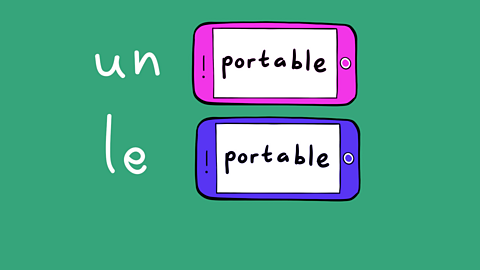The present tense: How to talk about what you do in French
âIf you are doing something right now then that's the present tense⦠â
Attends! J'ai un message - Wait! I have a messageâ.
Où es-tu? - Where are you?â
Je suis dans ma chambre - I'm in my bedroom.
Je fais is the present tense of the verb faire - 'to do' or 'to make':
je fais - I do, I am doing â
tu fais - you do, you are doing â
il fait - he does, he is doing â
elle fait - she does, she is doing â
Je fais mes devoirs. Qu'est-ce que tu fais? - I am doing my homework. What are you doing?
Je regarde les jeux vidéo des vloggers - I am watching vloggers play video games.â
Je regarde is the present tense of regarder to watch. â
Regarder is an -er verb and there are lots of -er verbs which follow the same pattern:â
je regarde - I watch, I am watchingâ
tu regardes - you watch, you are watching â
il regarde - he watches, he is watching
elle regarde - she watches, she is watchingâ
Je prends le bus - I'm taking the bus.
Je prends is the present tense of the verb prendre - to take:
je prends - I take, I am taking â
tu prends - you take, you are taking â
il prend - he takes, he is taking
elle prend - she takes, she is taking â
Tu prends le bus? - Are you taking the bus?â
Oui⦠je prends le bus - Yes, I am taking the bus.
There's nothing like living in the âpresent.âAllons-y! - Let's go!
When to use the present tense
You use the present tense to give facts, to talk about what you do on a regular basis, and âto say what you are doing right now.â
- Je mange une pomme - I am eating an apple OR I eat an apple.â
- Tu vas au cinéma? - Do you go to the cinema? (on a regular basis) OR Are you âgoing to the cinema (right now)?â
- Il joue au hockey - He plays hockey OR He is playing hockey.â
How to use regular -ER verbs
Rule: Remove the -er from the end of the infinitive and add the appropriate ending for âeach pronoun.
Infinitives are the basic form of a verb, before any changes for tense or people are made ââ- like jouer (to play) or vendre (to sell).â
For example, jouer (to play):â
| French pronoun | stem | ending | Example |
|---|---|---|---|
| je | jou | â-±ð | je joue - âI play |
| tu | jou | â-±ðs | tu joues - you play |
| il / elle | jou | â-±ð | il / elle joue - he / she plays |
| nous | jou | â-´Ç²Ô²õ | nous jouons - âwe play |
| vous | jou | â-±ðz | vous jouez - âyou play (polite or plural) |
| ils | jou | â-±ðnt | ils jouent - âthey play (mixed group or masculine) |
| elles | jou | â-±ðnt | elles jouent - âthey play (feminine group) |
- Je joue au rugby le weekend, mais il joue au tennis - I play rugby at the weekend, but âhe plays tennis.â
There are lots of other -ER verbs that follow the same rule:â
- manger - to eat
- regarder - to watch
- 鳦´Ç³Ü³Ù±ð°ù - to listen to
- habiter - to live
- aimer - to like
- parler - to speak
- »åé³Ù±ð²õ³Ù±ð°ù - to hate
How to use regular -IR verbs
Rule: Remove the -ir from the end of the infinitive and add the appropriate ending for âeach pronoun.â
For example, finir (to finish):â
| Pronoun | Stem | ending | Example |
|---|---|---|---|
| je | fin | â-¾±²õ | je finis - I finish |
| tu | fin | â-¾±²õ | tu finis - you finish |
| il / elle | fin | â-¾±³Ù | il / elle finit - he/she finishes |
| nous | fin | â-¾±²õsons | nous finissons - we finish |
| vous | fin | â-¾±²õsez | vous finissez - you (polite or plural) finish |
| ils | fin | â-¾±²õsent | ils finissent - they finish (mixed group or masculine) |
| elles | fin | â-¾±²õsent | elles finissent - I finish (feminine) |
How to use regular -RE verbs
Rule: Remove the -re from the end of the infinitive and add the appropriate ending for âeach pronoun.â
For example, vendre (to sell):â
| French pronoun | Stem | ending | Example |
|---|---|---|---|
| je | vend | â-²õ | je vends - I sell |
| tu | vend | â-²õ | tu vendsâ - you sell |
| il / elle | vend | (no ending) | il / elle vend - he / she sells |
| nous | vend | â-´Ç²Ô²õ | nous vendons - I sell |
| vous | vend | â-±ðz | vous vendez - I sell |
| ils | vend | â-±ðnt | ils vendent - I sell |
| elles | vend | â-±ðnt | elles vendent - I sell |
- Tu vends ton portable? - Are you selling your mobile phone?â
Irregular verbs
aller - to go
- je vais - I go
- tu vas - you go
- il / elle va - he / she goesâ
boire - to drink
- je bois - I drink
- tu bois - you drink
- il / elle boit - he / she drinksâ
faire - to do / make
- je fais - I make / do
- tu fais - you make / do
- il / elle fait - he / she makes / does
lire - to read
- je lis - I read
- tu lis - you read
- il / elle lit - he / she reads
Some verbs have regular endings, but you have to change an accent or double a âconsonant when you want to conjugate them in the present tense. Here are some âexamples of these types of verbs:â
±è°ùé´Úé°ù±ð°ù - to prefer
- je préfè°ù±ð - I prefer
- tu préfè°ù±ðs - you prefer
- il / elle préfè°ù±ð - he / she prefersâ
²õâa±è±è±ð±ô±ð°ù - to be called
- je mâappelle - I am called
- tu tâappellesâ - you are called
- il / elle sâappelleâ - he / she is calledâ
Quiz
Find out how much you know about the present tense in French with this short quiz.
More on Grammar
Find out more by working through a topic
- count7 of 8

- count1 of 8

- count2 of 8
